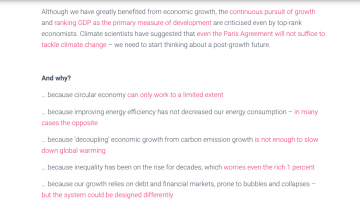
“We think about the capitalist economy and the democracies of advanced economies as being about freedom, but that’s a particular kind of freedom: the freedom to choose from different products on a supermarket shelf; the freedom to do whatever we want in our free time whatever the impact on the environment; or the freedom to move to a more destructive or powerful job through our career. In trying to achieve those freedoms, we’ve cut down certain others: the freedom to care about each other, the freedom to interact, the freedom to have time to contemplate, the freedom to work on ourselves, or the freedom to have a full and creative life supported by our society and community.”
says Tim Jackson, in a interesting interview resulting from the Post-Growth 2018 conference at the European Parliament, which happened recently. The conference marked a milestone in the history of the post-growth debate, which has predominately been contained within academic circles. The Post-Growth 2018 Conference brought together stakeholders to explore alternative policies. Their aim was to challenge the EU institutions that do not seem to be aware of the dramatic changes in the policy making that are urgently needed.
Post Growth is defined as a worldview that sees society operating better without the demand of constant economic growth. It proposes that widespread economic justice, social well-being and ecological regeneration are only possible when money inherently circulates through our economy.

If this seems something new, it is not actually. Robert Kennedy’s famous speech at the University of Kansas in 196 questioned GDP by asking poignant questions, and that was more than 50 years ago. Kennedy wasn’t just also talked about what makes life worthwhile and what we understand as social progress.
Post Growth ideas are gaining a bit more acceptance lately, due to people finally realising how mainstream economics simply cannot continue without holding full responsibility for the externalities it is fostering. Even projects of sustainable development, such as improving eco-efficiency, will simply not work to save the environment or provie us with improved social impact, within a capitalist growth-oriented system.
Tim Jackson who participated in the conference and is the author of the book Prosperity Without Growth, a book that resulted from a report for the Sustainable Development Commission (its pdf version can be seen here) mentions in the aforementioned interview, how it is actually the current system the one that is undoing the growth paradigm as it is reaching its limits. He says:
“The economy undid itself and at the time I thought it was accidental, that it undid itself because we weren’t paying attention to the right things. But in retrospect I think that it was much more fundamental and that we actually destroyed growth from within. Because it was the financial architecture of that growth-based system that motivated the extension of credit, the looseness of monetary policy, and the expansion of balance sheets to the point of instability. The ‘growth fetish’ gave us both the crisis and now the motivation for talking about what might happen beyond the growth-based system.
It’s not just environmental limits, it’s the growth-based system itself that is running into its own limits.”
But does this mean we are all going to become poor again ? If so, no social actor is interested in post growth, asks the interview. To which Tim answers:
“There’s another way of thinking about it, which is that inequality between rich and poor, the instability that inequality causes, and the further instability of a financial system created to push for growth against fundamental forces such as declining labour productivity, simply end up making the whole system and its politics more unstable.”
But the post growth movement, as it stands now, is still just a theory mostly embraced by academics and some Green Parties, and it has also its limitations.
Another academic part of the movement, who participated in the interview, is Giorgos Kallis. Giorgos Kallis is an environmental scientist working on ecological economics and political ecology. He is currently a Leverhulme visiting professor at SOAS. Kallis says:
“We are engaging more people in our research. We’re not just showing that we are overshooting ecological limits, but are exploring alternatives too. The younger minds that join the degrowth discussions are excited and bring fresh ideas. At the degrowth conferences, I see energy and new people – both researchers and activists – putting their bodies on the line to stop fossil fuel extraction whilst thinking seriously about how we can live differently and the politics to get us there.”

The interview then addresses the fundamental question and achiles heel of this mouvement, which is what would a post-growth world mean for the international system, which sees states trade and compete with one another? And Kallis answers:
“That’s the question we have thought about least in the degrowth movement because it’s the most difficult. A lot of our thinking tends to look at how one nation could be made stable without growth. But it is true that we live in a globalised economy characterised by competition.
If the degrowth or post-growth transition is to start, it will have to start in one of the core countries: the US, Germany, England. Post-growth policies have to take root in countries that have the political power at the global level to do things differently while protecting themselves economically.”
The full interview can be accessed here.

Maria Fonseca is the Editor and Infographic Artist for IntelligentHQ. She is also a thought leader writing about social innovation, sharing economy, social business, and the commons. Aside her work for IntelligentHQ, Maria Fonseca is a visual artist and filmmaker that has exhibited widely in international events such as Manifesta 5, Sao Paulo Biennial, Photo Espana, Moderna Museet in Stockholm, Joshibi University and many others. She concluded her PhD on essayistic filmmaking , taken at University of Westminster in London and is preparing her post doc that will explore the links between creativity and the sharing economy.






























